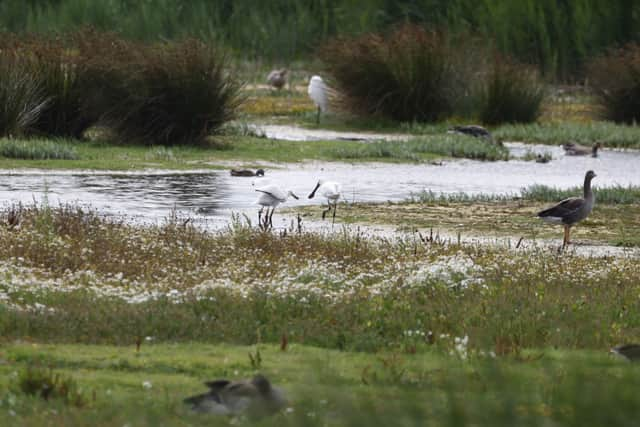Norfolk Broads celebrating its first successful spoonbill chicks in nearly 400 years
and live on Freeview channel 276
Norfolk Wildlife Trust is celebrating the sight of fledgling spoonbills stretching their wings and trilling to their parents once more – as the species sees its first known breeding success in the Norfolk Broads for around 400 years.
Hickling Broad nature reserve has become a haven for spoonbills in recent years, the trust says, thanks to a combination of habitat management and increasing numbers of the once-rare migrants across Britain. However, this is the first summer that chicks have successfully hatched.
Advertisement
Hide AdAdvertisement
Hide AdHistorically the spoonbill was a regular visitor to Southern England, arriving in summer before flying south for the winter. There are records of birds nesting in East Anglia in the 1300s, but the trust says due to their fen homes being drained - and eggs and chicks being taken for food -spoonbill numbers dwindled and the mid 1600s saw the last bird nesting in the Norfolk Broads.


For more than 300 years, not a single spoonbill chick was raised in Britain. But in the 1990s the population started to boom again in the Netherlands, and a colony eventually re-established itself in the UK in 2010.
Robert Smith, Norfolk Wildlife Trust's Senior Reserves Assistant, said it has been a privilege to monitor the spoonbills over the past few years at Hickling - and now he could officially celebrate the return of a former lost breeding species to the Broadland landscape.
“Watching the fledgling flying around the reserve and hearing its trilling begging call as it pesters its parents for food is a truly wonderful sight and sound. It shows that our work to enhance the habitats on our reserves and across Norfolk is hugely important to the survival of our wildlife, including visitors such as the spoonbill," he said.
Advertisement
Hide AdAdvertisement
Hide AdThe spoonbill is a large white heron-like species that stands three feet tall and has a wingspan of four feet. It gets its name from its long bill, which has a flat, spoon-shaped tip. The species is of conservation concern across Europe, and a very rare breeding bird in the UK.
It is believed that there are just eight breeding sites in the whole of England. Their fledglings are affectionately referred to as 'teaspoons'.
The trust says the fledglings at Hickling will commute between their nest in the trees and the pool at first, before further afield when they are brave enough. In the winter, the family will leave the nest for good and head south - but perhaps not too far away, with Poole Harbour identified as a key wintering spot for Norfolk's spoonbills.
With a bit of luck, visitors to Hickling Broad and Marshes may be able spot the adult spoonbills and fledglings out on Brendan’s Marsh or flying around the reserve. The trust advises that people can maximise their chances of spotting the birds by using binoculars or telescopes.
Comment Guidelines
National World encourages reader discussion on our stories. User feedback, insights and back-and-forth exchanges add a rich layer of context to reporting. Please review our Community Guidelines before commenting.
